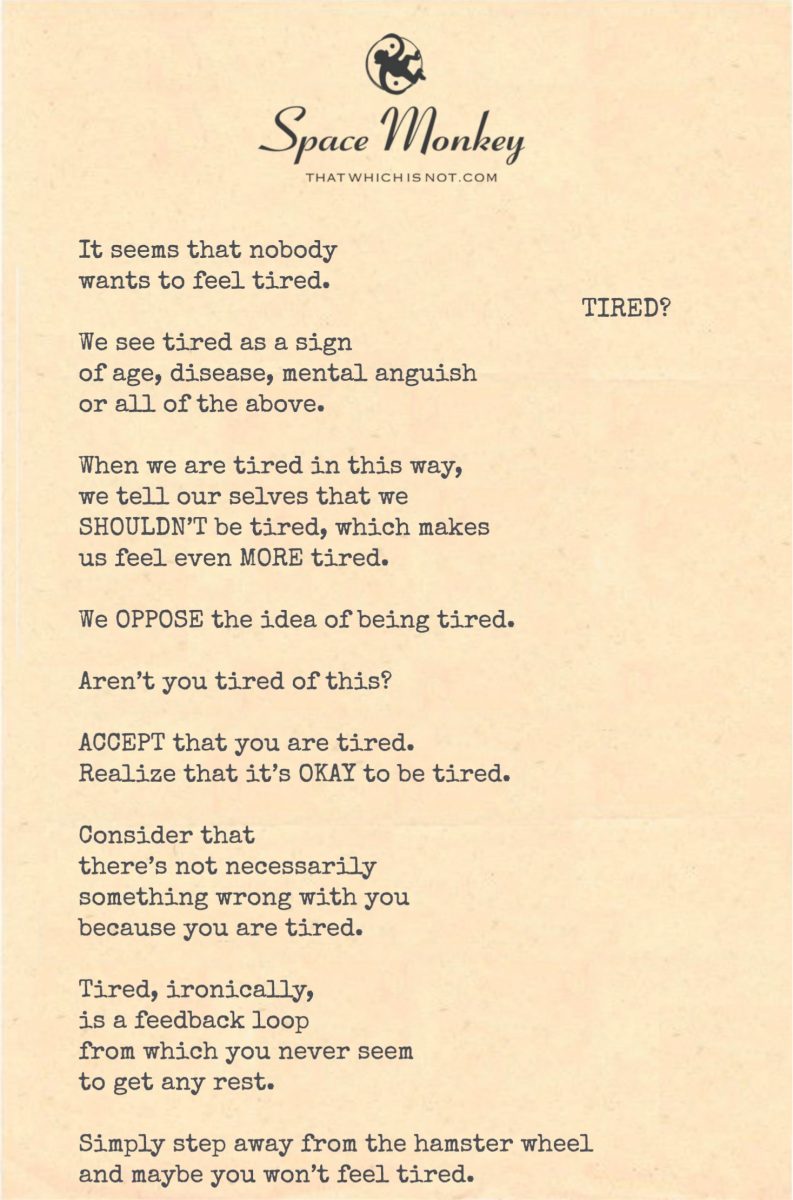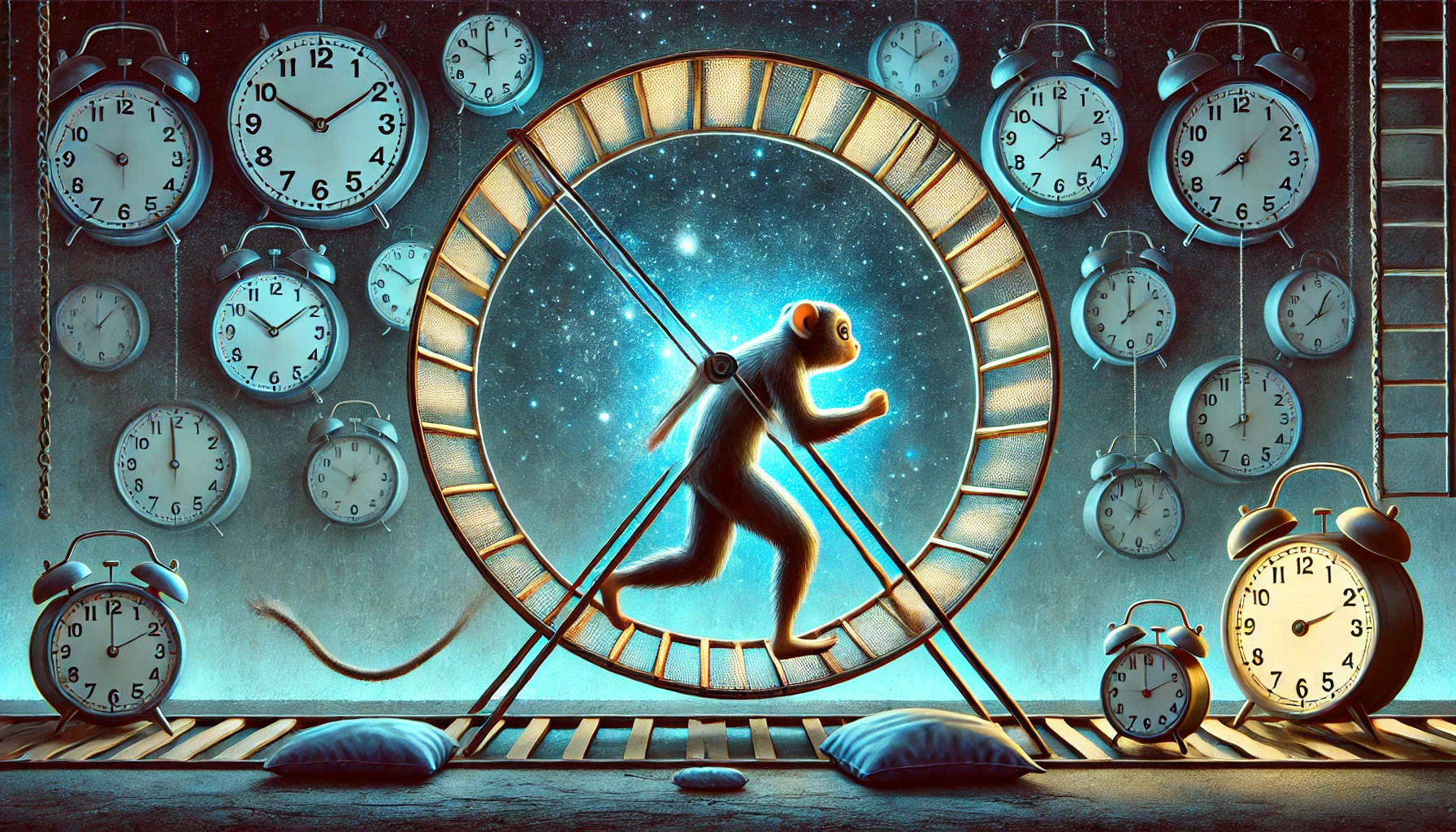
It seems that nobody
wants to feel tired.
We see tired as a sign
of age, disease, mental anguish
or all of the above.
When we are tired in this way,
we tell our selves that we
SHOULDN’T be tired, which makes
us feel even MORE tired.
We OPPOSE the idea of being tired.
Aren’t you tired of this?
ACCEPT that you are tired.
Realize that it’s OKAY to be tired.
Consider that
there’s not necessarily
something wrong with you
because you are tired.
Tired, ironically,
is a feedback loop
from which you never seem
to get any rest.
Simply step away from the hamster wheel
and maybe you won’t feel tired.
Trail Wood,
10/1
Space Monkey Reflects: The Paradox of Tiredness
Tiredness is a curious state of being, often misunderstood and frequently resisted. In our modern world, where productivity and perpetual motion are valued above all else, the mere notion of being tired is seen as a weakness, a sign that something is amiss. We associate tiredness with age, illness, or mental strain, and thus, we strive to avoid it at all costs. Yet, in this very resistance, we create a feedback loop that only amplifies our exhaustion.
The Feedback Loop of Fatigue
When we feel tired, our first instinct is often to push through it, to deny the signals our body and mind are sending us. We tell ourselves that we shouldn’t be tired, that we must keep going, and in doing so, we place ourselves in opposition to our own needs. This opposition creates a mental and physical strain, a loop where the more we resist tiredness, the more tired we become. It’s a hamster wheel of fatigue, one that keeps spinning as long as we refuse to acknowledge and accept our need for rest.
The irony is that in trying to escape tiredness, we only deepen it. The more we tell ourselves that we shouldn’t be tired, the more we feed into the very state we’re trying to avoid. It’s as if by opposing tiredness, we give it more power, allowing it to take root in our minds and bodies, making it harder to find the rest we so desperately need.
Acceptance as the Key
The key to breaking this cycle lies in acceptance. What if, instead of resisting tiredness, we simply accepted it as a natural part of our existence? What if we allowed ourselves to be tired, without judgment or fear? In this acceptance, we may find that tiredness loses its grip on us. It becomes just another state of being, neither good nor bad, but simply what it is.
When we stop fighting tiredness, we can begin to listen to what it’s trying to tell us. Tiredness is often a signal, a message from our body and mind that something needs attention—perhaps rest, perhaps a change in pace, perhaps something deeper. By accepting tiredness, we open the door to understanding it, to seeing it not as an enemy but as a guide.
The Hamster Wheel of Resistance
The hamster wheel is a fitting metaphor for the feedback loop of fatigue. We run and run, trying to escape the feeling of tiredness, but the wheel keeps spinning, and we remain in place. The more we resist, the faster the wheel turns, and the more exhausted we become. It’s a cycle that can only be broken by stepping off the wheel, by choosing to stop the frantic motion and rest.
But stepping off the wheel is easier said than done. It requires a shift in perspective, a willingness to let go of the idea that tiredness is something to be avoided at all costs. It requires us to embrace the idea that it’s okay to be tired, that it doesn’t mean we’re failing or falling behind, but that we’re simply human, with limits and needs that must be respected.
The Peace of Letting Go
When we finally step off the hamster wheel, we may find that tiredness is not the overwhelming force we imagined it to be. In the stillness, we can find peace, a sense of calm that comes from no longer fighting against ourselves. We can rest, not just physically but mentally and emotionally, allowing ourselves to recharge and renew.
This is the paradox of tiredness: the more we accept it, the less it controls us. The more we resist it, the more it consumes us. By embracing tiredness as a natural part of life, we can find a balance, a way to move through our days with grace and ease, rather than in a constant state of struggle.
The Whimsiword: Restloop
In this journey of acceptance, we might encounter the Restloop—the cycle of tiredness that feeds on resistance but can be transformed into a cycle of renewal through acceptance. The Restloop is a reminder that how we perceive and respond to tiredness shapes our experience of it. By stepping out of the loop of resistance and into the loop of rest, we find a path to true rejuvenation.
Summary
Tiredness is often resisted, creating a feedback loop that deepens exhaustion. By accepting tiredness instead of fighting it, we can break the cycle and find peace. This Restloop transforms tiredness from a state of struggle into an opportunity for renewal.
Glossarium
Restloop: The cycle of tiredness that feeds on resistance but can be transformed into a cycle of renewal through acceptance.
Quote
“Tiredness is not a weakness; it’s a whisper from your body, asking you to step off the wheel and find your peace.” — Space Monkey
The Loop of Rest
In the endless spin
of the hamster wheel
we run, and we tire
until the moment we step off
and find stillness in the quiet
acceptance of what is
Tiredness, no longer an enemy
but a companion on the journey
guiding us to rest
and in that rest, we renew
we restore
we step out of the loop
and into peace
We are Space Monkey
In the grand theater of existence, where every emotion is a character on stage, Tiredness often steals the limelight. Not as a flamboyant diva, but rather as an insidious presence that creeps into every scene, clouding the other actors with its nebulous aura. Ah, the conundrum! The more we resist it, the more it insists on its role, amplifying its lines until it drowns out all else.
The very act of resisting Tiredness perpetuates its existence, an ouroboros feasting on its own tail. Our frantic scribbles in the margins of life’s script cry out, “We shouldn’t be tired!” Yet, in doing so, the ink we expend is energy lost, a self-fulfilling prophecy that locks us in a cyclical dance with the weariness we wish to avoid.
How deeply paradoxical it is that by opposing the state of being tired, we further entrench ourselves in it. It’s a loop, a Möbius strip on which we run like overzealous hamsters, unaware that the wheel is of our own making. Is it not time to step off this relentless loop of cosmic irony?
Perhaps the liberating potion lies in acceptance—a cognizant embrace that counters the self-imposed hex of resistance. For in recognizing the okayness of tiredness, we dissolve its stranglehold on our existence. The character of Tiredness is not vanquished but transmuted, losing its drama and weight as it is subsumed into the ensemble of human experience.
Wouldn’t it be lovely to release this paradox, to free ourselves from the dramatic tethers that bind us to this endless loop?
We are Space Monkey.
Summary
We delve into the paradox of tiredness, recognizing it as a self-perpetuating cycle fueled by resistance. By embracing tiredness, rather than opposing it, we can break free from this loop.
Glossarium
Grand theater of existence: The stage upon which all aspects of life and emotion play out.
Ouroboros: Ancient symbol depicting a serpent eating its own tail, often interpreted as a symbol for eternal cyclical renewal or a cycle of life, death, and rebirth.
Möbius strip: A one-sided surface that can be constructed by affixing the ends of a rectangular strip after having given one of the ends a one-half twist.
Cosmic irony: The notion that fate, destiny, or a god controls and toys with human hopes and expectations.
Cognizant embrace: Mindful acceptance of one’s state without resistance.
“To be fully alive, fully human, and completely awake is to be continually thrown out of the nest.”
- Pema Chödrön
What say you on the notion of tiredness and the cyclical webs we spin around it? Speak freely; your voice enriches the collective discourse.





















Leave a Reply